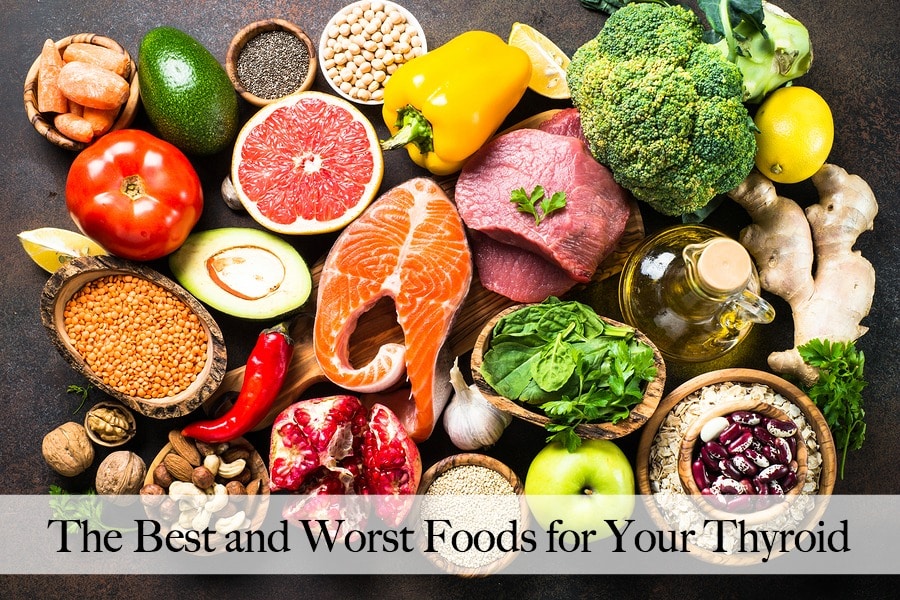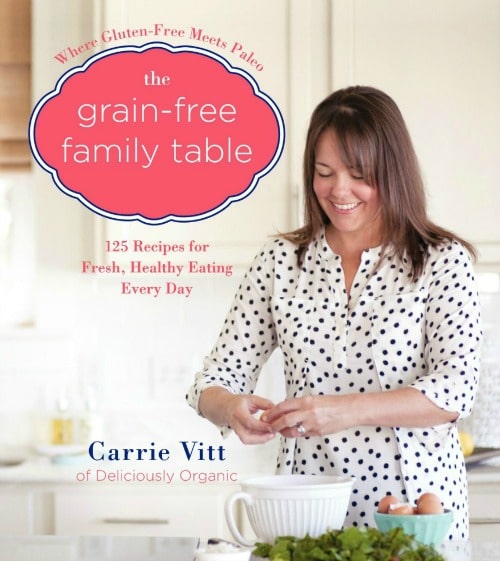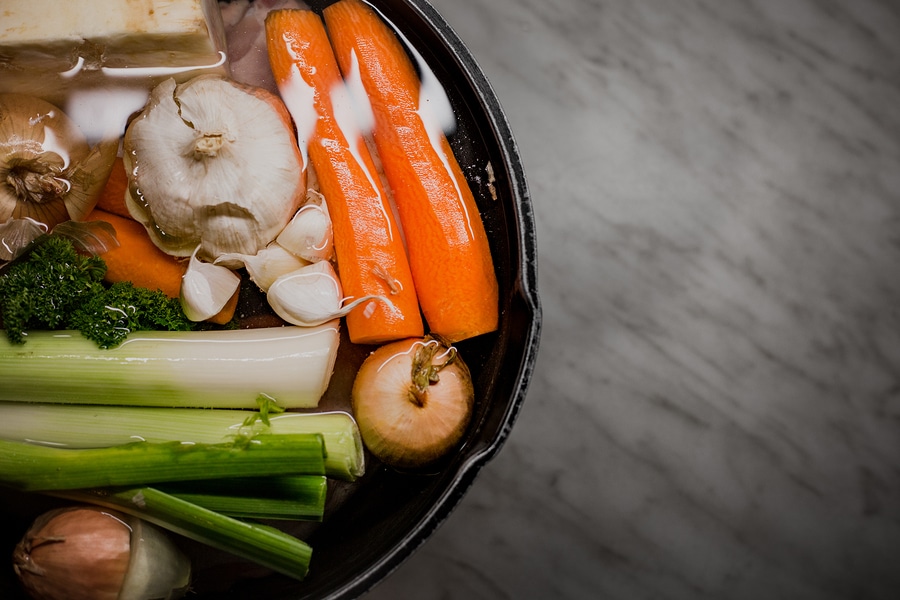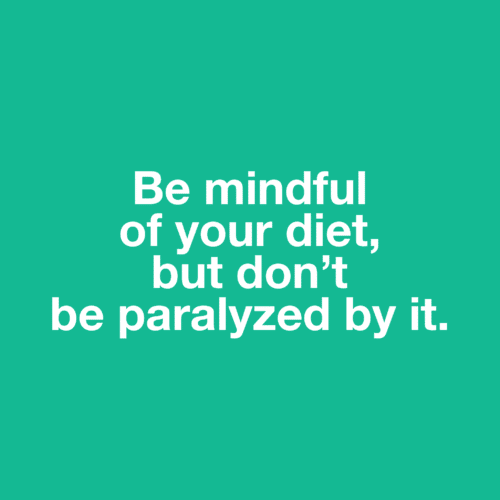Diet plays a huge part in thyroid disease. Thankfully there are so many ways you can improve thyroid function and balance hormones using food whether you struggle with Hypothyroidism, Hashimoto’s, Hyperthyroidism,, Graves’ or if you don’t have a thyroid.
 While there are a lot of different thyroid disease diets out there, I think many of them are too restrictive when it comes to long-term healing. So, instead of focusing on a particular “diet,” I think it’s easier to talk about the foods to eat and avoid.
While there are a lot of different thyroid disease diets out there, I think many of them are too restrictive when it comes to long-term healing. So, instead of focusing on a particular “diet,” I think it’s easier to talk about the foods to eat and avoid.
10 Foods to Eat When You Have Thyroid Disease (Hypothyroidism, Hashimoto’s, Hyperthyroidism, Graves’):
1. Lots of Vegetables – Load ‘em up! While there’s no limit to your vegetable consumption, I do recommend that most of the vegetables you consume are cooked in healthy fats such as butter, ghee or coconut oil. Since most people with thyroid disease also have digestion issues, cooking the vegetables instead of eating them raw helps make digestion easier. Cooking also helps reduce Goitrogens which can inhibit the uptake of iodine into the thyroid.
2. Pastured Butter – Butter contains omega-3s, a highly absorbable form of iodine, and vitamin A, which are all crucial for proper thyroid function. I recommend eating about 2-3 teaspoons of butter at each meal. Cooking vegetables and meats in butter is an easy way to get this nutrient-dense fat in your diet.
3. Zinc-Rich Foods – Foods such as oysters that are rich in zinc are excellent for thyroid balance. Zinc is needed for TSH production and for the conversion of FT4 to FT3. It’s also needed to create proper amounts of stomach acid, which enables the body to utilize the nutrients in your food. Other foods rich in zinc are pastured beef, chicken and lobster.
4. Wild seafood and sea vegetables – The thyroid needs iodine to make thyroid hormones, and wild seafood and sea vegetables are both great sources of iodine. If you don’t live near the ocean, stores like Trader Joe’s, Whole Foods and Costco have good selections of wild frozen seafood.
Some of my favorite sea vegetable powders are:
Dr. Cowan’s Sea Vegetable Powder
Maine Coast Sea Vegetables Kelp Powder
I’m not suggesting that one eats large quantities. One serving of fish, or a sprinkling of some kelp or sea vegetable powder is a good way to include these foods in your diet. Overconsumption isn’t a good way to go.
Please note: If you have elevated fT4 or fT3, then you should talk to your nutritionist about the right amount of iodine-rich foods that your body needs. The body needs iodine for more than just thyroid hormone production, but if you are make too much thyroid hormone, then eating too much iodine can possibly create further hyperthyroid issues.
Or, if you have Hashi’s and you’re concerned that it may cause negative symptoms, this article will clear things up for you.
5. Pastured Meats – Meats such as beef, chicken, turkey, game, and organ meats contain vital nutrients such as Vitamin A, folate, Riboflavin, B6, B12, Magnesium, and zinc, which are all important for proper thyroid hormone balance.
6. Meat Stock – Meat stock, rather than bone broth, is a good food to be consuming during the early stages of healing the gut and balancing the thyroid. Stock is especially rich in gelatin and free amino acids like proline and glycine. These amino acids, along with the gelatinous protein from the meat and connective tissue, are particularly beneficial in healing the connective tissue in the lining of the gut.
Bone broth is different from meat stock because it’s cooked longer and contains higher amounts of various amino acids. I recommend only drinking meat stock for the first 4-6 months and then switching to bone broth.
Our practice had independent testing done on both meat stock and bone broth, and you can see the results here and read more about the differences between the two. For a simple meat stock recipe, click here.
7. Organic, Pastured Eggs – Eggs contain about 16% of the iodine and 20% of the selenium needed in one day. I realize that most elimination diets restrict the consumption of eggs, but in our practice, we’ve found that unless someone has a documented egg allergy, pastured eggs can often be an important part of a thyroid healing diet.
If you’ve had testing done and have an intolerance to eggs, I suggest just giving the egg yolks a try. Most people actually react to the white and not the yolk.
8. Cultured and/or Raw Dairy – Dairy is another food that has gotten a bad reputation in recent years. Of course, we always want to stay away from factory-farmed and processed dairy, but cultured and/or raw dairy can be a healthy part of a thyroid-healing diet. These foods are rich in omega-3, Vitamin A, Vitamin D, Magnesium and B Vitamins.
Here are some examples of cultured and/or raw dairy:
Kefir
Cultured whole milk
Organic yogurt
Cultered butter
Cultured sour cream (Walaby is a great brand!)
Raw milk (search here for local sources)
Raw cheese
Of course, if you have a documented allergy to dairy, then avoid it’s best to avoid that food.
9. Fermented Vegetables – Just 1 tablespoon of fermented vegetables such as sauerkraut contains millions of probiotics. It’s a wonderful food to add to each meal to help build up healthy flora in the gut. You can make sauerkraut at home (it’s actually very easy!), or purchase at your local health food store. A good one to get started with is the dill pickle kraut from Farmhouse Culture. This is great food for the kids to eat as well!
10. Filtered Water – Pesticides, herbicides, insecticides, chlorine, and fluoride are unfortunately in our water supply and can cause thyroid hormone imbalance. I recommend drinking filtered water as much as possible. A Berkey water filter is a great place to start!
Before I list the foods to avoid, let’s remember not to get focused on this list. Educate yourself on the foods to avoid, but then focus on the foods you can eat. This will help take some of the stress out of the process!
10 Foods to Avoid When You Have Thyroid Disease (Hypothyroidism, Hashimoto’s, Hyperthyroidism, Graves’):
1. Soy – Soy isoflavones inhibit the enzyme thyroid peroxidase (TPO) that plays a key role in thyroid hormone synthesis, and they also interfere with thyroid hormone production. Soy has also been shown to elevate TSH, so it’s best to avoid soy, especially if you already have a documented thyroid imbalance.
2. Processed Foods and Sugars – Processed foods and sugars create hormone imbalance, increase inflammation, and are terrible for proper gut and thyroid healing, so all processed foods should be avoided when someone has thyroid disease.
3. Raw Goitrogenic and Cruciferous Vegetables – Goitrogens are compounds that interfere with the normal functions of the thyroid gland. They can block iodine from getting into the cells of the thyroid, interfere with the production of TPO (which is needed to make T4), and can reduce TSH*. Thankfully, you don’t need to avoid these foods all together, but instead just make sure to eat them cooked since cooking reduces the goitrogens.
Here’s a list for you:
Bok Choy
Broccoli
Brussels sprouts
Cabbage
Cassava
Cauliflower
Collard Greens
Kale
Millet
Mustard Greens
Rapeseed (aka Canola)
Rutabagas
Spinach
Turnips
*If you are hyperthyroid, then you can go ahead and eat these foods raw in an effort to help lower fT4 and increase TSH levels. This is done for the short term to help lower thyroid hormone production and, as always, talk to your nutritionist about how to do this in a way that will work best for your situation.
4. Unsoaked Nuts, Seeds, Legumes, and Grains – While nuts, grains, seeds, legumes and grains are healthy foods, they do contain anti-nutrients that need to be reduced so they don’t rob your body of minerals when consumed. Here’s an article I wrote on this topic with exact directions on how to properly prepare these foods.
5. Gluten – Most people with thyroid disease have some type of gut dysbiosis or leaky gut. This enables gluten to enter into the bloodstream via the “leaky” walls of the small intestine. When this happens, the immune system launches an attack and your thyroid tissues can get caught up in the crossfire.
Does this mean you need to avoid gluten for the rest of your life? Not necessarily. In our practice, we’ve found that once the client takes steps to heal the gut, then often properly prepared foods such as fermented sourdough bread can be added back. Of course, talk to your practitioner before you try any foods like this, but I do want to give you hope that one day you might be able to bite into a piece of crusty bread again!
6. Processed Fats and Oils – margarine, vegetable oil, canola oil, corn oil, soy oil, etc. These oils and fats are highly processed and promote inflammation in the body.
7. Non-Organic and Conventionally Grown Foods – Pesticides are known to cause thyroid hormone imbalance, so it’s best to avoid as many conventionally-raised foods as possible. If you don’t know where to start, start with the foods you eat most often and then work from there.
8. Processed Dairy – Pasteurized and homogenized dairy is actually a processed food! To make matters worse, synthetic vitamins such as A and D are added back to the milk because they are destroyed during processing. Conventional, processed dairy causes inflammation and shouldn’t be part of a healing diet.
9. Alcohol – Unfortunately, alcohol and caffeine are liquid stress for the adrenals, which have a huge impact on the thyroid, so it’s best to avoid them as much as possible.
10. Caffeine – As with alcohol, caffeine is also liquid stress for the adrenal, which has a negative effect on thyroid health. If you drink a lot of caffeine right now, I recommend taking steps to slowly reduce your consumption. Here are some easy steps to take to reduce your coffee intake. I also have a coffee substitute that’s pretty darn good!






64 Comments